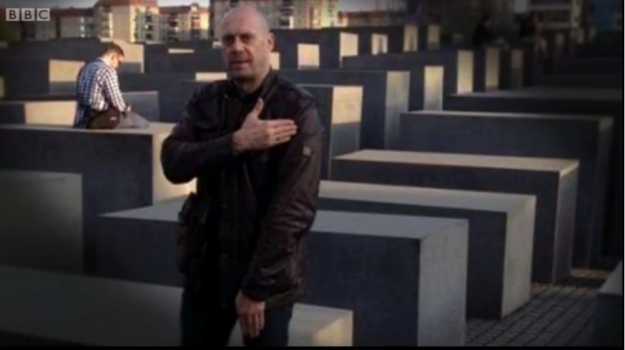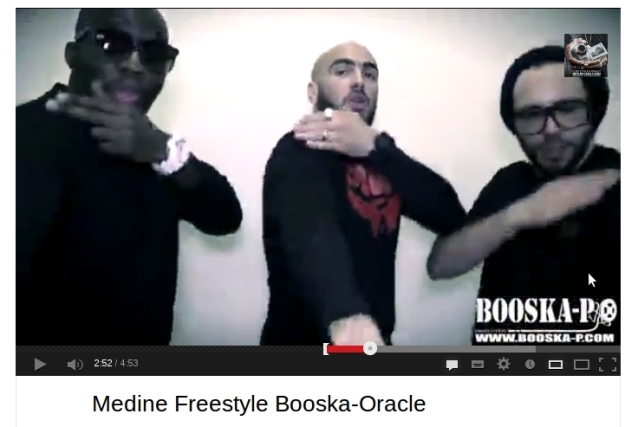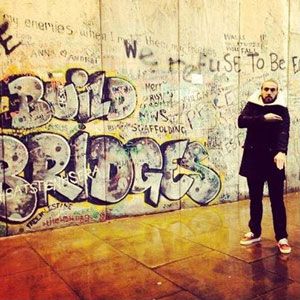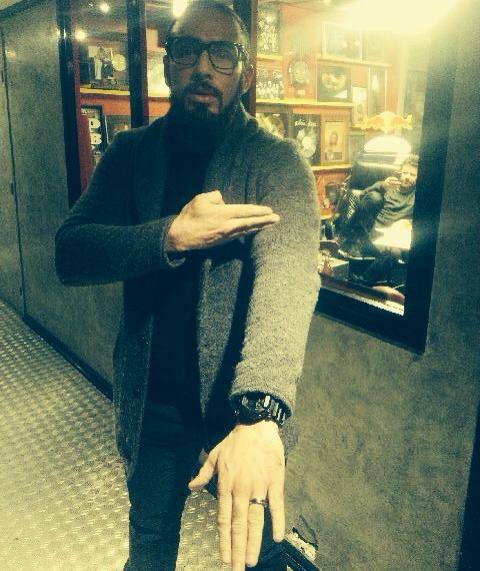BACKGROUND
MC Soraal was released as a standalone track on May 28, 2014, the first song released after Protest Song. The track came out as a response to a real-world controversy concerning Dieudonné, Médine and the ‘Quenelle’.
Dieudonné, a controversial comedian who holds, according to many critics, extreme antisemitic positions, has, in 2005, used a gesture that he called the ‘quenelle’.
In 2014, several well-known right-wing figures were pictured performing the ‘quenelle’, including several high-profile controversial figures who are explicitly antisemitici, and it has therefore been reinterpreted in the mass media as a general symbol of antisemitism and right-wing ideology. Some celebrities who took pictures of themselves performing the ‘quenelle’ include right-wing National Front leader Jean-Marie Le Pen and ex-National Front employee and controversial political activist Alain Soral.
The ‘quenelle’ is a very controversial gesture because it looks like an inverted Nazi salute and, if Dieudonné’s use of the ‘quenelle’ was initially ambiguous, its reappropriation by well-known right-wing figures has been interpreted by much of the mainstream media as antisemitic ideology. It is easy to see why, especially considering that the location where the ‘quenelle’ was performed was often quite explicit (e.g. Alain Soral at the Berlin Holocaust Memorial).
At the same time, Dieudonné was mostly blamed for the ‘quenelle’ because he is not only the one who invented it but is also often seen as antisemitic.
Médine, however, had a different opinion of Dieudonné, and Médine said in an interview with Rapelite: « même si c’est pas très intelligent ce qu’il fait […] Dieudonné a plus contribué à désamorcer des sujets comme le racisme que l’inverse ».
In 2014, Médine performed the ‘quenelle’, several times in fact.
Considering Médine’s explicitly pro-Muslim positions, this was a risky move on his part. Predictably, he was accused of antisemitism on various right-wing media.
On February 8, 2014, he was invited on a French talk show called ‘Salut les Terriens’. The video has unfortunately been taken down from YouTube, but in the video he was confronted with his use of the ‘quenelle’, and Médine argued that the original ‘quenelle’, the one originally used by Dieudonné, was merely a gesture that was ‘antisystème’, and carried none of the antisemitic ideology present today. His ‘quenelle’ was therefore ‘une quenelle antisystème’, and thus qualitatively different from Alain Soral’s ‘quenelle’, which was explicitly antisemitic (1 2).
This goes back to my discussion of Médine’s purposeful use of the word Jihad on his second album. He knew that using Jihad, and performing the ‘quenelle’, would be controversial, specifically because they had acquired a distorted meaning and were reappropriated and instrumentalized by certain groups. It looks like Médine, therefore, consciously decided to perform the ‘quenelle’ in order to, once again, incite discussion on the meaning of the symbol.
THE SONG
The name of the song is a wordplay between MC Solaar, a very famous French rapper, and Alain Soral, who used the ‘quenelle’ for antisemitic purposes.
The song begins with a short sample of MC Solaar’s ‘Bouge de là’, perhaps MC Solaar’s most famous song, and also a phrase that Médine reappropriates many times in the chorus and throughout the song. Using this phrase, and also by using a formal structure ‘Entre [x] et [y]’ that stylistically compares oppositions, Médine wants to criticize the tendency for people, especially during his appearances in talk-shows, to try to fit him into one of two extremes. In this case, it’s either ‘MC Solaar’, i.e. a rapper with no political message or affiliation, or ‘Alain Soral’, whose entire discourse is political and whose ‘quenelle’ has a specific meaning. Médine, through this song, therefore attempts to make the listener realize that not everything is black and white, and that he has nuanced positions about ideas and topics but that the media always try to make him fit into their pre-made boxes. Médine’s opinions are nuanced, but people always tell him to ‘bouge de là’.
Here is a short excerpt:
[Refrain]
On m’a dit : bouge de là !
Joue pas le père la morale
Vas-y bouge de là ; t’es ni mon prêtre, ni mon imam
Alors bouge de là ! Soit t’es le bien, soit t’es le mal
Ou bien bouge de là
Bouge de là, anti-système des bacs à sable
Vas-y bouge de là, le grand écart c’est pour Van Damme
Alors bouge de là ; soit t’es Solaar soit t’es Soral
MC bouge de là !
An interesting verse is:
Entre le majeur et l’index, je suis le sixième doigt
The ‘majeur’ being the finger that people use to ‘give the finger’, and the index being the finger that people to point things out, Médine situates himself between those two extremes, between being completely against the system and someone who only complains about the system.
The song is much closer in theme, tone and lyrical content to his earlier work, and reminded me much more of Arabian Panther. In fact, at the end of the song, Médine says:
C’est le retour de l’Arabian Panther
Au dessus c’est l’Solaar
Au dessus du sky Mc Soraal
Hé, fini les prout’ lines
Retour aux lignes de Proust
therefore announcing his return as a more virulent critic of society and returning to his former, more literary style of making references and creating rap of a more academic nature.
Read next: Don’t Laïk






